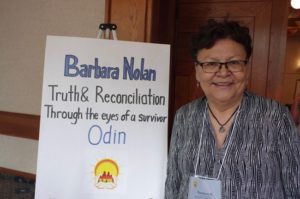Recovering residential school memories at wellness conference in Thunder Bay

By Rick Garrick
THUNDER BAY—Garden River’s Barb Nolan spoke about recovering memories of residential school at the Biidaaban Healing Lodge Strengthening Our Bundles Annual Wellness Conference on May 26 in Thunder Bay.
“As human beings, we tend to forget,” Nolan says during her How to Strengthen Your Bundle keynote speech. “We block it out because our mind is a very powerful thing. We only remember the good things.”
Nolan says she used to think of her residential school experience as being “really nice” until she recovered more of her memories in 1985 during a workshop on grief, when a participant spoke about being abused in residential school.
“She started talking about her abuses and her words triggered my mind,” Nolan says. “And I could really relate. The same thing happened to her that happened to me that I forgot all these years.”
Nolan says that the workshop was the start of her healing journey.
“That was the start of me finding out: ‘Okay, what happened, Barbara? What can’t you remember? What don’t you want to remember?’,” Nolan says. “So I started looking for individuals to help me, I started looking for talking circles somewhere, I started looking for mentors. I knew I had to make Barbara feel better.”
Nolan says some people do not want to remember traumatic experiences in their life.
“Some don’t want to go there,” Nolan says. “They don’t want to remember. ‘Oh, I dealt with that already,’ they say. Maybe they didn’t, maybe they did. We just have to take their word for it.”
Nolan also delivered two workshops on Truth and Reconciliation through the Eyes of a Survivor during the conference.
“In the keynote address, I spoke about the self, you as the individual, but in this workshop I mainly spoke about [you] as a group of Anishinabe people,” Nolan says. “We were here before 1492, we had everything intact, we had our own government, we had our own education system, we had all our economics, all of that. We had a good society and then change came in 1492. It didn’t just start in 1867 or whatever year that was when the government started taking power, jurisdiction and control over our people.”
Nolan also spoke about where First Nations people are today and where they are going.
“How are we going to improve, how are we going to get out of the situation that our people are in,” Nolan says. “How are we going to better ourselves as Anishinabe people.”
Nolan says there were some good comments and sharing in the workshops.
“We have to talk about the truth, we have to recognize it — what actually happened to our people,” Nolan says. “And then we have to reconcile, we have to forgive the past. That is one thing when you are doing healing, you have to forgive. You have to forgive the oppressor, you have to forgive the past if we are going to move on in a good way.”
About 94 participants attended the conference from across northwestern Ontario.
“It looks at improving the physical, the spiritual, the mental and the emotional aspects of healing and how do we make healthier individuals, families and communities,” says Simone Desmoulin, executive director of Biidaaban Healing Lodge, which is located in Biigtigong Nishnaabeg. “One of the things we are looking at is how do we incorporate the traditional cultural aspects of healing to empower our First Nations to live that good life, Minobimaadziwin, to walk in wellness, to walk in balance.”


